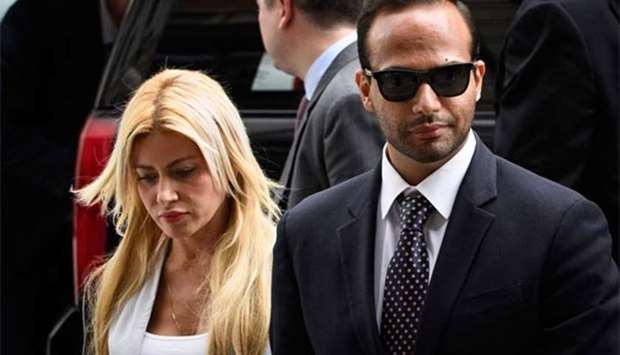A former adviser to US President Donald Trump whose contacts with Russians set off the investigation into possible collusion with Moscow was jailed on Friday for lying to the FBI.
US District Judge Randolph Moss sentenced foreign policy aide George Papadopoulos to 14 days in prison, acknowledging his guilty plea and his remorse, but noting that he "lied in an investigation that was important to national security."Papadopoulos was the second person ordered to prison in the sprawling, 16-month Russia collusion investigation of Special Counsel Robert Mueller. It came just over two weeks after two former top Trump aides were convicted of felony crimes in cases that grew out of the probe.
Trump suggested the conviction was trivial for a probe that has cost millions since it launched in May 2017 -- while ignoring the 35 indictments, five guilty pleas and one trial conviction Mueller has racked up so far.
"14 days for $28 MILLION - $2 MILLION a day, No Collusion. A great day for America!" Trump tweeted.
Senator Mark Warner, the senior Democrat on the Senate Intelligence Committee, which has its own Russia collusion investigation, applauded Mueller's work.
Despite constant attacks by the president, Mueller and his team "are conducting a serious, professional investigation" into the 2016 Trump campaign's contacts with Russians, Warner said in a statement.
Papadopoulos, 31, was an inexperienced London-based oil analyst when he joined the Trump campaign in March 2016 on the Republican candidate's national security advisory board.
Told the campaign's priority was to improve relations with Russia, within weeks Papadopoulos made contact with a mysterious professor, Joseph Mifsud, who touted links to the Kremlin.
Mifsud introduced him to others who ostensibly had connections to Russian President Vladimir Putin -- including a woman who claimed to be Putin's niece.
At a campaign meeting at the end of March 2016 Papadopoulos told Trump, then-senator and now Attorney General Jeff Sessions, and other campaign officials that he had connections in London that could set up a Trump-Putin meeting ahead of the November election.
"While some in the room rebuffed George's offer, Mr Trump nodded with approval and deferred to Mr Sessions, who appeared to like the idea and stated that the campaign should look into it," Papadopoulos's lawyers said in a pre-sentencing statement last week.
Sessions has claimed he opposed the idea, but Papadopoulos continued to discuss it with top campaign officials over the following months.
Papadopoulos told CNN in a late Friday interview that Trump "gave me a sort of a nod" and "wasn't committed either way" at that meeting -- but that Sessions "was actually enthusiastic" about a Trump-Putin gathering.
He also said that Mifsud told him in April that the Russians had "thousands of emails" about Clinton -- which Papadopoulos described as a "momentous statement" but not a direct offer of assistance.
His reaction was that Mifsud "was simply repeating gossip and rumors," Papadopoulos said.
Did he tell anyone?
"All I can say about this question -- because I've been asked a million times -- is if I told anyone it would have been discovered by now," he told CNN.
"As far as I remember, I absolutely did not share this information with anyone on the campaign.
"I might have, but I have no recollection of doing so."
Weeks later, the stolen Clinton emails were posted online by what US intelligence chiefs now say were Russian intelligence actors.
The mysterious Mifsud has since vanished, CNN said.
FBI agents quietly opened a probe into Trump campaign officials possibly colluding with Russia after they were tipped off by an Australian diplomat that Papadopoulos had spoken about Russians having dirt on Clinton.
Papadopoulos admitted that he lied to FBI investigators when they interviewed him.
"In January 2017, I made a terrible mistake for which I paid dearly, I am ashamed," Papadopoulos told the court in Washington. "I was young and ambitious."
His lawyer Tom Breen said that at the time, Papadopoulos was naive and acted on what he told the court was a "misguided loyalty" to Trump, who had been inaugurated as president just one week before.
Breen noted that Trump was already calling the allegations of Russian election interference "fake news" and a "political witch hunt" -- terms he continues to use for the Mueller probe.
Trump "hindered this investigation more than George Papadopoulos ever did," Breen said.
Judge Moss said he considered Papadopoulos's "genuine remorse" in issuing the light sentence, which included a $9,500 fine, a year on parole and community service.
Papadopoulos has cooperated for more than a year with Mueller's probe, but it remains unknown whether he has provided investigators with any information supporting allegations of collusion with Russia.
Mueller's office did not immediately comment on the sentence.

